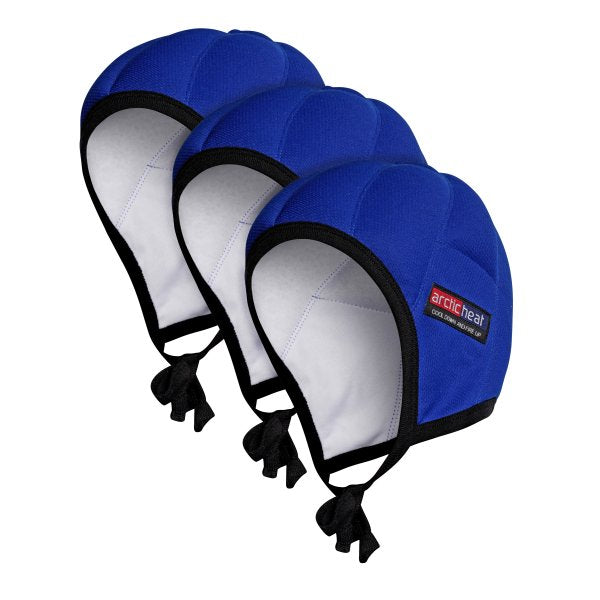
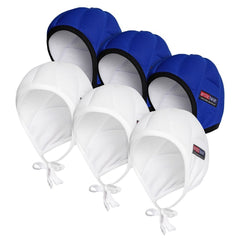
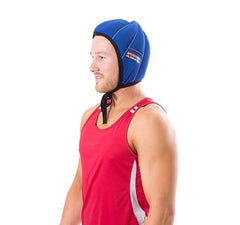
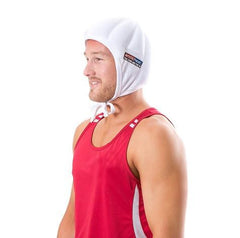
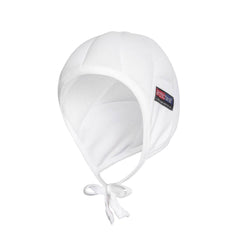
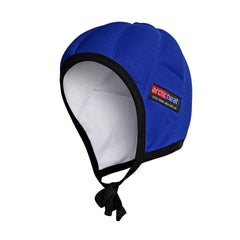
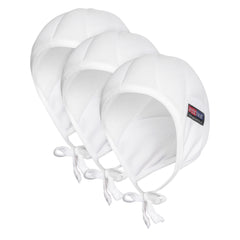
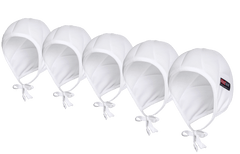
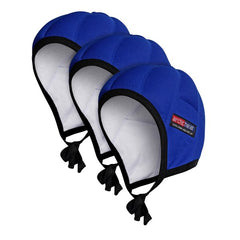
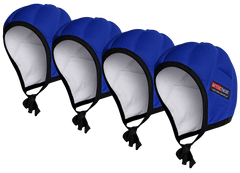
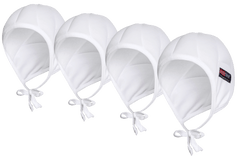
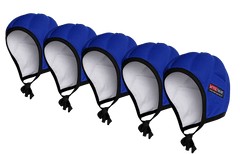
ARCTIC HEAT COOLING CAP - ChemoKit
Available in packs of 3, 4 or 5 caps that may assist during Chemotherapy to retain hair through scalp cooling.
We advise to apply the first cooling cap on the way to chemotherapy, others during the treatment and the final cooling cap on the way home from hospital.
The ChemoKits are available in packs of 3. 4 and 5 cooling caps to suit your infusion time. Scalp cooling needs to be continues from before, during and after the treatment.
It is advisable to check with your oncologist about the length of time infusion will take to make sure you have enough caps cooled for the required time.
How scalp cooling works
Every hair on the body grows out of a hair follicle. Small blood vessels in the scalp supply the cells of these follicles with food and oxygen, and carry away waste products.
Any chemotherapy drugs in the bloodstream will also be carried to the hair follicles. When blood vessels in the scalp are cooled they become smaller, and so less blood flows through them.
Cooling the scalp during chemotherapy means that less of the chemotherapy drug reaches the hair follicles, which means the hair is less likely to fall out.
One widely available method of scalp cooling uses a ‘cold cap’, which is filled with a gel that can be chilled. The Arctic Heat Cooling cap. The cap must be fitted snugly around the head to work properly.
Who can have scalp cooling?
Scalp cooling is not suitable for everyone.
It isn’t suitable:
- with hematological cancers, such as melanoma, leukemia and lymphoma, as there is a high risk of cancer cells surviving in the blood vessels of the scalp and causing the cancer to come back after treatment
- for some people who need very high doses of chemotherapy, as scalp cooling is less likely to work with very high doses of the drugs
- if you’re having continuous chemotherapy through a pump for several days, as this makes it impractical to have scalp cooling
- for some patients whose liver isn’t working as well as it should – this may lead to the chemotherapy drugs circulating in the body for longer than usual, and it may not be possible to keep the scalp cold for long enough
- for people who have severe migraines.
For scalp cooling to work, your scalp temperature needs to be kept low for the whole time the drugs are circulating in your blood.
This means that your scalp needs to be cold for about 30-40 minutes before your chemotherapy drugs are given, throughout the time chemotherapy is given and for about 30-40 minutes afterwards.
When using the Arctic Heat Cooling Cap you are usually free to walk about once your chemotherapy has been given. However, your cap will need to be changed during treatment to keep your scalp cool, so you can’t go too far from the chemotherapy department.
Using a cool cap that is attached to cooling machines means you will need to sit by the machine while the cap is in place, so you won’t be able to walk about freely with this method.
You’ll probably feel chilly when having scalp cooling and may need to wear warm clothes. Hot drinks will help you feel warmer. Rarely you may get a headache during scalp cooling, especially in hot weather.
How effective is scalp cooling?
Scalp cooling can be effective in preventing or reducing the loss of your hair. But you won’t know how well it will work for you until you try it.
Despite scalp cooling, you may find that your hair thins slightly. Unfortunately, some people who have scalp cooling will still lose their hair. Some people, who lose their hair over a prolonged period while using scalp cooling, find this harder to cope with than the quicker and more predictable hair loss that occurs without scalp cooling.
Scalp cooling only protects the hair on your scalp. Body hair – including eyelashes, eyebrows, beards and mustaches, chest hair and pubic hair – may be lost.
Hair loss caused by chemotherapy is almost always temporary. Once the treatment is over, your hair will start to grow back. At first the hair is very fine, but you’ll probably have a full head of hair after 3-6 months. You may find that the texture or colour of your hair is different but this is often temporary. After about 12 months, new hair growth may be similar to the colour and texture you had before chemotherapy.
If you’re interested in scalp cooling, discuss this with your doctor or nurse. They can advise whether it’s suitable for you.
Activation and Useful tips:
- Initially soak in water for 5- 10 minutes so crystal in pockets swells into gel form. (pockets should be firm but not bursting).
- When removing from water gently twist in opposite directions to remove excess water.
- Vigorously wipe inside and outside of the product with a towel. (some gel/slime may escape simply wipe it away).
- Hang inside out till material is completely dry.
- Place dried caps in the freezer, after 2-3 hours maximum cooling is achieved. If the caps are stiff (frozen) when taken out of freezer (after a longer period than 3 hours) simply leave them out to defrost.
- Use a Cooler-Bag to transport caps to your Chemotherapy. Caps should be covered with an ice block. Cool remaining caps until they are needed.
- Product must be applied 45-60 min. before drug-therapy/infusion starts (Pre-Cooling Time).
- Product must always have a close contact to scalp.
- You always have to change caps after max. 1-1.5 hours – cooling time per cap 1 to max. 1,5 hours.
- Cap change must happen as quickly as possible to avoid dilation of the blood vessels.
- Caps must be used during the complete therapy-session (Infusion Time).
- Cap must be applied for 45-60 minutes directly after infusion (Post Infusion Cooling Time).
- Please consider applied drug and required Pre-, Infusion- and Post-Cooling Time – 2 – 5 Cooling Caps will be required.
- Product must be used during every therapy-session.
- If you notice a partial hair loss, prolong post cooling time.
- A few days before your chemotherapy and a few days after do not wash, blow-dry or dye your hair and other actions that will increase circulation of the scalp.
- Store caps in freezer and remove them the day before your next chemotherapy to thaw the gel pockets (hang product). Cool caps again for 2 to 3 hours in the freezer (before going to the treatment) to ensure that the required temperature is reached.(see point 5.)
Partial hair loss, e.g. after the first treatment can be stopped with continued cooling therapy.Therefore, you should not resign after a possibly less successful 1st treatment – always go through two to three treatments to achieve a positive result.
Use of cooling caps is suitable for malignant, solid tumors such as breast cancer, colon cancer, prostate cancer or lung cancer etc.
Contraindications – Use of a Cooling Cap is not recommended with:
- Hematological malignancies (leukemia, non Hodgkin’s and other generalized lymphomas)
- Manifest scalp metastases. Please ask your doctor.
When the crystal/gel pockets start to dehydrate and become flat start activation from step 1.
Storing
- Whilst in activated (gel) state, product must be stored by hanging in a ventilated area
DO NOT STORE IT IN THE FRIDGE!
- If wishing to store for long periods, allow item to completely dehydrate (returning it to crystal) then put it into storage
- To re-activate, start from step 1.
Washing
- Simply hand wash in warm water with mild soap for no more than 2 minutes
- Hang to dry
- Occasionally beads of gel may appear, this is not a fault simply wipe away with a cloth
Please Note: Gel crystals are non-sensitive to skin and mucous membranes, are not absorbed by skin and are non-toxic.

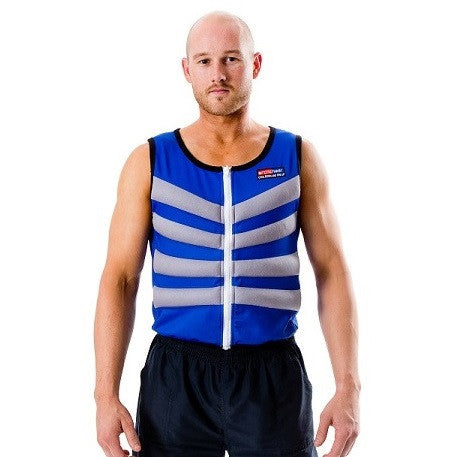
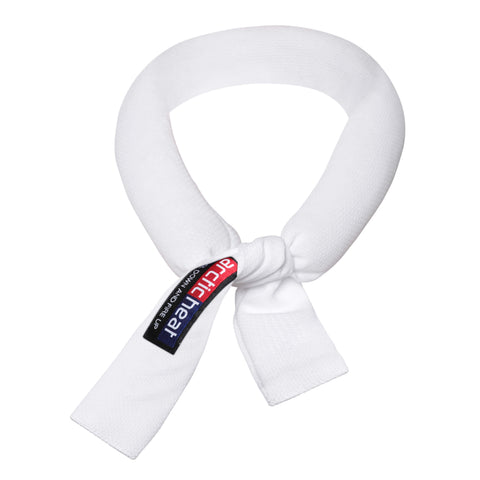
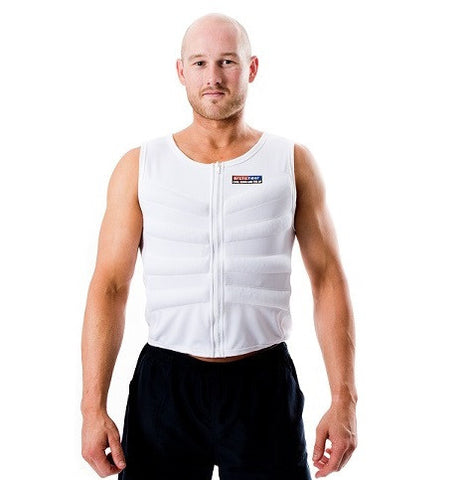
 Liquid error (layout/theme line 473): Could not find asset snippets/spurit_uev-theme-snippet.liquid
Liquid error (layout/theme line 473): Could not find asset snippets/spurit_uev-theme-snippet.liquid